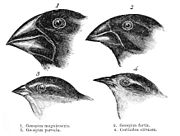
Evolutionary biology

The discipline emerged through what Julian Huxley called the modern synthesis (of the 1930s) of understanding from several previously unrelated fields of biological research, including genetics, ecology, systematics, and paleontology. Current research has widened to cover the genetic architecture of adaptation, molecular evolution, and the different forces that contribute to evolution including sexual selection, genetic drift and biogeography. The newer field of evolutionary developmental biology ('evo-devo') investigates how embryonic development is controlled, thus creating a wider synthesis that integrates developmental biology with the fields covered by the earlier evolutionary synthesis. Evolution is the central unifying concept in biology. Biology can be divided in various ways. One way is by the level of biological organisation, from molecular to cell, organism to population. An earlier way is by perceived taxonomic group, with fields such as zoology, botany, and microbiology, reflecting what were once seen as the major divisions of life.A third way is by approach, such as field biology, theoretical biology, experimental evolution, and paleontology. These alternative ways of dividing up the subject can be combined with evolutionary biology to create subfields like evolutionary ecology and evolutionary developmental biology. More recently, the merge between the biological science and applied sciences gave birth to new fields that are extensions of evolutionary biology, such as evolutionary robotics, engineering, algorithms, economics, and architecture. The basic mechanisms of evolution are applied directly or indirectly to come up with novel designs or solve problems that are difficult to solve otherwise. The research generated in these applied fields in turn contribute to progress, especially thanks to work on evolution in computer science and engineering fields such as mechanical engineering. The idea of evolution by natural selection was proposed by Charles Darwin in 1859, but evolutionary biology, as an academic discipline in its own right, emerged during the period of the modern synthesis in the 1930s and 1940s. It was not until the 1980s that many universities had departments of evolutionary biology. In the United States, many universities have created departments of molecular and cell biology or ecology and evolutionary biology, in place of the older departments of botany and zoology. Palaeontology is often grouped with earth science. Microbiology too is becoming an evolutionary discipline, now that microbial physiology and genomics are better understood. The quick generation time of bacteria and viruses such as bacteriophages makes it possible to explore evolutionary questions. Many biologists have contributed to shaping the modern discipline of evolutionary biology. Theodosius Dobzhansky and E. B. Ford established an empirical research programme. Ronald Fisher, Sewall Wright and J. S. Haldane created a sound theoretical framework. Ernst Mayr in systematics, George Gaylord Simpson in paleontology and G. Ledyard Stebbins in botany helped to form the modern synthesis.James Crow, Richard Lewontin, Dan Hartl, Marcus Feldman, and Brian Charlesworth trained a generation of evolutionary biologists. Current research in evolutionary biology covers diverse topics and incorporates ideas from diverse areas, such as molecular genetics and computer science.
